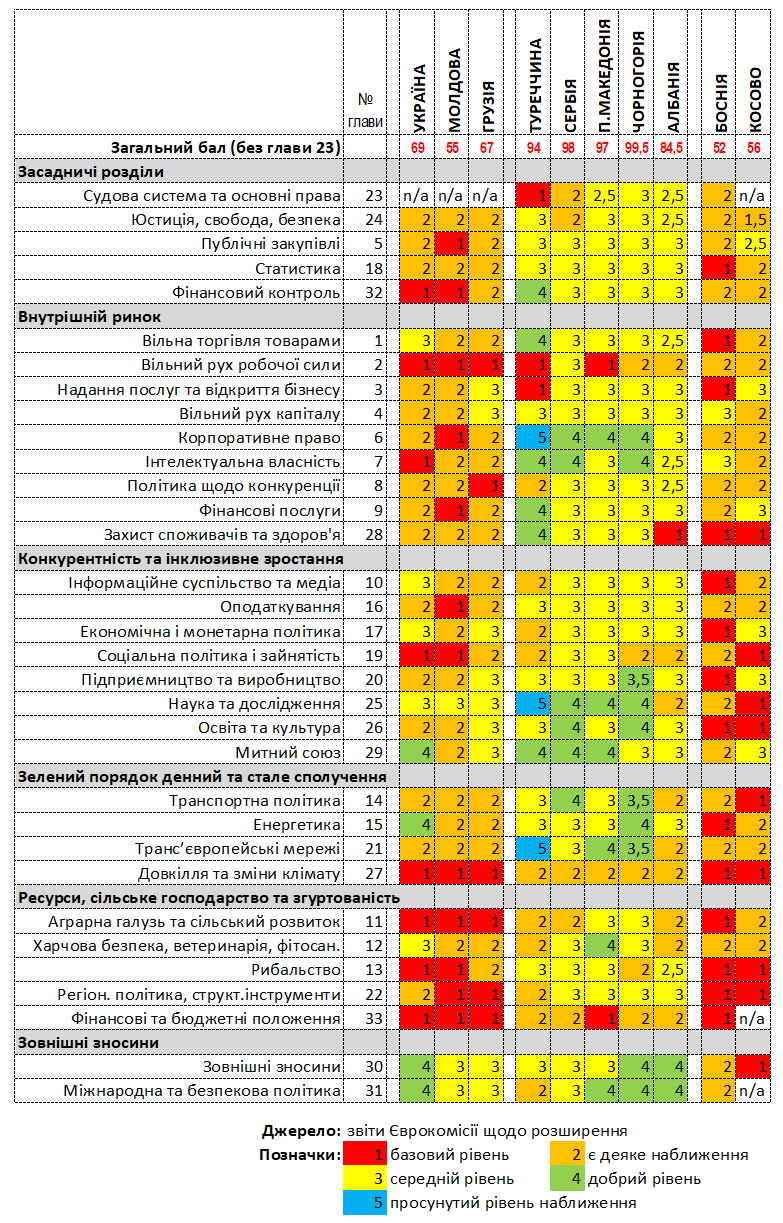
Is Ukraine ready to join the EU? Brussels’ assessment
During the visit to Kyiv last week, Ursula von der Leyen handed over to President Zelenskyy an assessment of compliance with the acquis, i.e., EU law, which the European Commission carried out simultaneously for Ukraine, Moldova, and Georgia. European Pravda studied the data in the document and also of other EU candidates and their dynamics. Here are the key findings of the publication.
The main conclusions are as follows:
- Bravura statements of Ukraine about the country’s high readiness for accession are groundless. Ukraine scored an average of 2 points on a 5-point scale.
- There is a widely spread opinion in our country and Ukraine’s progress in European integration has been so great in the past few years that it is now ahead of the Balkans. Analysis of the European Commission points to a different result: Ukraine’s indicators for 2022 are even inferior that the Balkan countries had in 2015!
- Nevertheless, Ukraine does indeed have a good growth potential, and can still move ahead of others. It is critical that Kyiv realizes that there are several reforms that have the biggest significance for Brussels and other European countries to recognize our progress.
- it is also important that even with the score of 2, Ukraine is the leader among Eastern Partnership countries, with Moldova showing the weakest results. This is also a challenge for us, seeing as the EU is set to “merge” European prospects of Kyiv and Chisinau.
How does the EU assess candidate countries?
Experts at the European Commission analyse the law and real situation in a candidate state based on each of the chapters, and draw a conclusion on the level of their alignment with the European law and practices.
The scores are based on a five-point scale system, where: 1 – initial level, 2 – some compliance with EU law, 3 – moderate compliance, 4 – good compliance, and 5 – advanced level. Also, the commission sometimes gives intermediate scores.
Based on the experience of other candidates, the EU agrees to recognize full or sufficient compliance with EU law and agrees to complete negotiations when the country’s score reaches 4 or 5 points; this depends on the specific chapter and many accompanying circumstances. Accession into the EU is possible once EU member countries agree to complete the negotiations on all chapters.
What progress has our country achieved?
The main conclusion: of the European assessment is that Ukraine’s level of European integration is chaotic and unsystematic.
Some Ukrainian laws and practices are really close to the EU, while in some areas the alignment is yet to begin, according to the EU’s assessment.
Ukraine received 4, which is a high score, for four out of 32 chapters, including the “Customs Union” (which is important for Kyiv seeking deeper trade liberalisation), energy, foreign policy, and security policy. The EU gave a 3, which is a good rating for a novice candidate (moderate compliance with EU law), to another five areas. At the same time, there were eight areas in which Ukraine was given the lowest score (meaning Ukraine very poorly complies with EU law in these areas).
In total, Ukraine has scored 69 points for 32 chapters with an average score of 2.16. Georgia scored 67 points and Moldova – only 55 points.
The EU applies the same methodology also to the “experienced” candidates – the states of Western Balkans and Turkey. The latter, however, is considered an outsider of the EU expansion process. The negotiations with Turkey have officially been suspended, as the country has been moving away from democracy in the past seven years, and its score of the European Commission’s assessment is regularly deteriorating.
Despite this fact, even now Turkey has 94 points (for the same 32 chapters, which Ukraine was assessed for). Montenegro tops the candidate ranking with 99,5 points. Serbia is second with 98 points.
Albania has the worst score at the accession negotiations stage – 84.5 points, and Tirana formally started negotiations only a year ago. But even this score is incomparably better than Ukraine’s score.
This comparison shows that the implementation of EU law in Ukraine is in its infancy. Essentially, Kyiv has only begun its path to accession, and there are no recipes that would allow to complete it before Ukraine adopts the laws required by the rules of the single European market.

To achieve success on our path towards the EU, we need to keep in mind two things.
First, Ukraine must gradually fulfil the technical criteria for accession. A huge number of legislative acts will have to be amended.
Secondly, Ukraine needs to prove to Brussels that the country can quickly solve the problems accumulated in the judicial system and human rights. Without tackling these two tasks simultaneously, Ukraine can simply forget about moving towards the EU quickly.
Media, Publications
-
Deputy Ambassador of the EU on enlargement, reforms and €190 billion in support
-
EU membership in 2030? Deputy Ambassador of the EU answers students’ questions
-
How does the EU take decisions on Ukraine? Subsidiarity, unanimity and consensus among 27 countries
-
What reforms does Ukraine still need to join the EU? Deputy Ambassador of the EU answers
-
How can Ukrainian students become more involved in EU programmes and projects? Deputy Head of the EU Delegation answers
-
Are there alternatives to European integration if the road to the EU is long? Deputy Ambassador of the EU answers